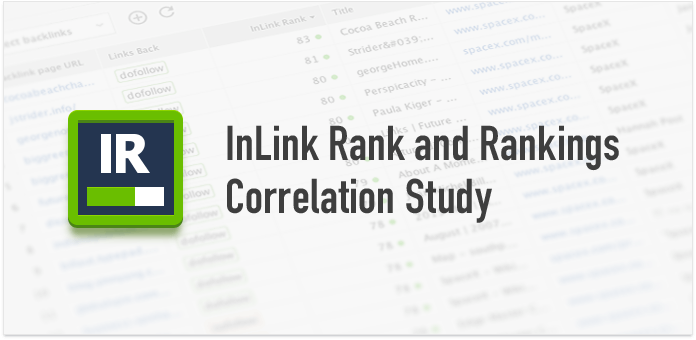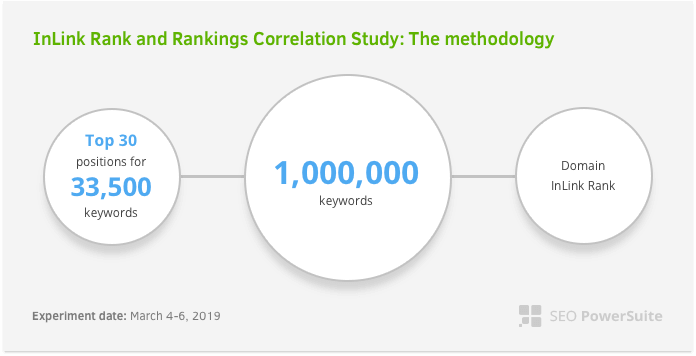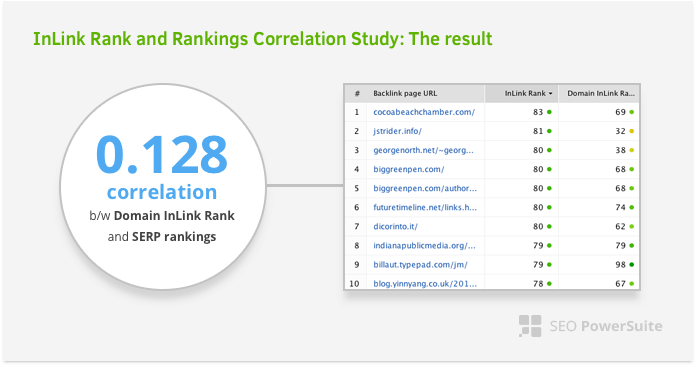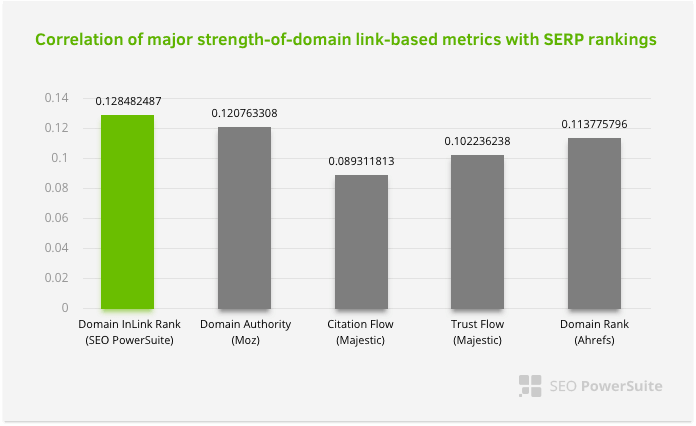
Domain InLink Rank and SERP Rankings Correlation Study


Many of you are familiar with InLink Rank, a metric by SEO PowerSuite, which reflects the ranking power of pages and domains. We came up with InLink Rank in 2016 as a replacement for Google PageRank, which was no longer publicly available but remained an important factor in Google's ranking algorithm.
At large, SEO PowerSuite's InLink Rank is based off the same formula as the original Google PageRank. However, we continuously keep improving the model behind it in several ways:
- Monitoring links for quality. Our algorithm detects spammy link networks, considerably cutting down the score of links associated with them and the score they pass further.
- Extending the pool of links we analyze. There are 1.92 trillion fresh (as opposed to historical) backlinks in our index now, with 7.5 billion web pages crawled daily.
To make sure InLink Rank brings value to our customers and really helps them define the quality of domains and pages, we regularly run various internal tests and experiments. We've just finished a massive study to track the correlation between Domain InLink Rank and SERP rankings that we'd like to share with you.
InLink Rank and Rankings Correlation Study:
The methodology
Over the course of 3 days, March 4-6, 2019, we looked at 30 positions in Google SERPs for 33,500 queries (give or take) to get a list of 1,000,000 URLs. For each URL, we recorded Domain InLink Rank. As a result, we've got 1,000,000 rows of data to analyze. You can access the raw data here. The keywords randomly taken from the Russ Jones and Grepwords keyword list of top high paying CPC, AdWords, and AdSense keywords, cover a wide range of query categories. The results were further compared with the correlations for Domain Authority (Moz), Citation Flow and Trust Flow (Majestic), and Domain Rank (Ahrefs), presented in a recent study by Moz.
Experiment date: March 4-6, 2019
Positions in SERPs: 1-30
Search results: 1,000,000 pages
Metric: Domain InLink Rank
Comparison: correlations for DA (Moz), CF and TF (Majestic), DR (Ahrefs)

InLink Rank and Rankings Correlation Study:
The results
Result 1: Correlation between SERP rankings and Domain InLink Rank is positive: 0.128482487
We calculated Domain InLink Rank for each SERP to find that the correlation is 0.128482487.

Thus, our experiment shows that there's a positive correlation between the position in Google SERPs and Domain InLink Rank for the pages, occupying that position. InLink Rank is a score on a logarithmic scale from 0 and 100, and, as you can see in the raw data sheet, URLs with lower rankings tend to have lower Domain InLink Rank, and vice versa — top ranking pages have higher Domain InLink Rank. Of course, this doesn't necessarily mean that higher Domain InLink Rank always leads to higher rankings, since correlation does not imply causation. However, in our opinion, Domain InLink Rank seems to be a viable metric to evaluate the ranking potential of particular domains.
Result 2: SEO PowerSuite's Domain InLink Rank has shown a 6% higher correlation compared to the next best competitor in the industry, Domain Authority by Moz
Last week Moz published a similar analysis, which calculated the correlation between SERP rankings and four metrics: Domain Authority (Moz), Citation Flow and Trust Flow (Majestic), and Domain Rank (Ahrefs). The methodology was similar to the one we used:
- The keyword range was statistically significant: 16,000 keywords randomly selected from the United States keyword corpus for Keyword Explorer.
- Top 10 positions were analyzed.
- Domain-level metrics were calculated.
According to this analysis, Moz's Domain Authority proved to have the strongest correlation with rankings out of the competing strength-of-domain link-based metrics. In particular, these are the correlations each of the metrics scored:
- Domain Authority (Moz): 0.120763308
- Domain Rank (Ahrefs): 0.113775796
- Trust Flow (Majestic): 0.102236238
- Citation Flow (Majestic): 0.089311813
If we put these results together in a chart, adding Domain InLink Rank score, this is the industry-wide picture we get:

As you can see, SEO PowerSuite's Domain InLink Rank proved to have a 6% stronger correlation compared to the next best competitor, Domain Authority by Moz. It should be noted that the analysis for Domain InLink Rank hasn't been performed on exactly the same set of keyword and number of positions as for the four other metrics. However, the statistical set for the Domain InLink Rank experiment appears to be strong enough (33,500 vs 16,000 keywords, top 30 vs top 10 positions) for direct comparison of correlation scores.
Summary
The main takeaways of this experiment and the comparison with analysis by Moz are:
- Industry-wide, the correlation between Domain InLink Rank and SERP rankings appears to be the strongest: 0.128482487, which is roughly 6% better than the next best competitor, Domain Authority by Moz. The third place is occupied by Domain Rank by Ahrefs (-11% compared to Domain InLink Rank), followed by Trust Flow (-20% compared to Domain InLink Rank) and Citation Flow (-30% compared to Domain InLink Rank) by Majestic.
- While Google PageRank algorithm, which no longer can be publicly checked, is still at the core of Google's ranking algorithm, none of the industry metrics mentioned in this analysis is directly used by Google and has any impact on rankings.
- Though none of the industry metrics mentioned in this article correlates strongly enough with the actual Google rankings, they are still a good starting point for evaluating the ranking potential of particular domains. Echoing what has recently been said by Barry Schwartz, focusing on PageRank alone was never a good SEO strategy, just as a singular focus on any other similar metric is not.


